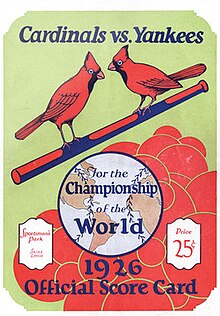| 1926 World Series | ||||||||||
|---|---|---|---|---|---|---|---|---|---|---|
 Rogers Hornsby tags out Babe Ruth who is caught attempting to steal second base, ending the 1926 World Series. | ||||||||||
| ||||||||||
| Dates | October 2–10 | |||||||||
| Venue(s) | Yankee Stadium (New York) Sportsman's Park (St. Louis) | |||||||||
| Umpires | Bill Dinneen (AL), Hank O'Day (NL) Bill Klem (NL), George Hildebrand (AL) | |||||||||
| Hall of Famers | Umpires: Bill Klem Hank O'Day Cardinals: Rogers Hornsby (player-manager) Grover Cleveland Alexander Jim Bottomley Chick Hafey Jesse Haines Billy Southworth‡ Yankees: Miller Huggins (manager)‡ Earle Combs Lou Gehrig Waite Hoyt Tony Lazzeri Herb Pennock Babe Ruth ‡ Elected as a manager | |||||||||
| Broadcast | ||||||||||
| Radio | Westinghouse Broadcasting | |||||||||
| Radio announcers | Graham McNamee and Phillips Carlin[1][2] | |||||||||
| Streaming | ||||||||||
| ||||||||||
The 1926 World Series was the championship series of the 1926 Major League Baseball season. The 23rd edition of the Series, it pitted the National League champion St. Louis Cardinals against the American League champion New York Yankees. The Cardinals defeated the Yankees four games to three in the best-of-seven series, which took place from October 2 to 10, 1926, at Yankee Stadium and Sportsman's Park.

This was the first World Series appearance (and first National League pennant win) for the Cardinals, and would be the first of 11 World Series championships in Cardinals history. The Yankees were playing in their fourth World Series in six years after winning their first American League pennant in 1921 and their first world championship in 1923.[3] They would play in another 36 World Series (and win 26 of those), as of the end of the 2023 season.[4]
In Game 1, Herb Pennock pitched the Yankees to a 2–1 win over the Cards. In Game 2, pitcher Grover Cleveland Alexander evened the Series for St. Louis with a 6–2 victory. Knuckleballer Jesse Haines' shutout in Game 3 gave St. Louis a 2–1 Series lead. In the Yankees' 10–5 Game 4 win, Babe Ruth hit three home runs, a World Series record equaled only four times since.[5] According to newspaper reports, Ruth had promised a sickly boy named Johnny Sylvester to hit a home run for him in Game 4. After Ruth's three-homer game, the boy's condition miraculously improved. The newspapers' account of the story is disputed by contemporary baseball historians, but it remains one of the most famous anecdotes in baseball history. Pennock again won for the Yankees in Game 5, 3–2.
Cards' player-manager Rogers Hornsby chose Alexander to start Game 6, and used him in relief to close out Game 7. Behind Alexander, the Cardinals won the final two games of the series, and thus the world championship. In Game 7, the Yankees, trailing 3–2 in the bottom of the ninth inning and down to their last out, Ruth walked, bringing up Bob Meusel. Ruth, successful in half of his stolen base attempts in his career,[6] took off for second base on the first pitch. Meusel swung and missed, and catcher Bob O'Farrell threw to second baseman Hornsby who tagged Ruth out, ending Game 7 and thereby crowning his Cardinals World Series champions for the first time.[7]: 80 The 1926 World Series is the only Series to date which ended with a baserunner being caught stealing.[8]
This World Series also started the Cardinals run of dominance in the National League. Between the years 1926 and 1934, St. Louis captured five National League pennants and won three World Series titles.
- ^ Patterson, Ted (2002). The Golden Voices of Baseball. Champaign, Illinois: Sports Publishing LLC. p. 29. ISBN 1-58261-498-9.
- ^ Smelser, Marshall (1993). The Life That Ruth Built: A Biography. New York: Bison Books. p. 337. ISBN 0-8032-9218-X.
- ^ "1923 MLB Season". ESPN. Retrieved May 20, 2007.
- ^ "New York Yankees Team Index". Sports-Reference, Inc. Retrieved May 20, 2007.
- ^ Ruth in 1928, Reggie Jackson in 1977, Albert Pujols in 2011 and Pablo Sandoval in 2012.
- ^ "Babe Ruth Statistics". Sports-Reference, Inc. Retrieved May 20, 2007.
- ^ Eig, Jonathan (2005). Luckiest Man: The Life and Death of Lou Gehrig. New York: Simon & Schuster. ISBN 0-7432-4591-1.
- ^ Vass, George (February 2001). "Obscure Records Part of the Game's Attraction". Baseball Digest. Archived from the original on February 6, 2016. Retrieved October 3, 2007.